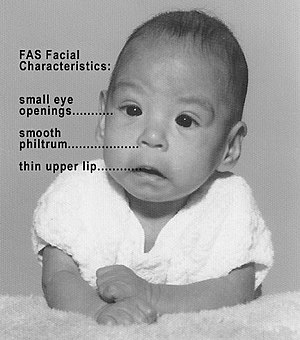Fetal alcohol spectrum disorders
| Fetal alcohol spectrum disorders | |
|---|---|
 |
|
| Baby with fetal alcohol syndrome. | |
| Specialty | Psychiatry, pediatrics, toxicology |
| Symptoms | Abnormal appearance, short height, low body weight, small head size, poor coordination, low intelligence, behavior problems |
| Duration | Long term |
| Causes | Drinking alcohol during pregnancy |
| Diagnostic method | Based on symptoms |
| Prevention | Avoiding drinking alcohol during pregnancy |
| Treatment | Parent-child interaction therapy, efforts to modify child behavior, possibly medications |
| Frequency | 2–5% (US, EU) |
| Classification |
· ·
|
|---|---|
| External resources |
Fetal alcohol spectrum disorders (FASDs) are a group of conditions that can occur in a person whose mother drank alcohol during pregnancy. Problems may include an abnormal appearance, short height, low body weight, small head size, poor coordination, low intelligence, behavior problems, and problems with hearing or seeing. Those affected are more likely to have trouble in school, legal problems, participate in high-risk behaviors, and have trouble with alcohol or other drugs. The most severe form of the condition is known as fetal alcohol syndrome (FAS). Other types include partial fetal alcohol syndrome (pFAS), alcohol-related neurodevelopmental disorder (ARND) and alcohol-related birth defects (ARBD). Some accept only FAS as a diagnosis, seeing the evidence as inconclusive with respect to other types.
Fetal alcohol spectrum disorders are caused by drinking alcohol during pregnancy. Surveys from the United States have found about 10% of pregnant women have drunk alcohol in the last month, and 20% to 30% drank at some point during the pregnancy. About 4.7% of North American women who are pregnant are alcoholics. The risk of problems depends on the amount consumed and the frequency of consumption as well as when during pregnancy the alcohol is consumed. Other risk factors include an older mother, smoking, and poor diet. There is no known safe amount or safe time to drink during pregnancy. While drinking small amounts of alcohol does not cause abnormalities in the face, it may cause behavioral issues. Alcohol crosses the blood brain barrier and both directly and indirectly affects a developing baby. Diagnosis is based on signs and symptoms in the person.
Fetal alcohol spectrum disorders are preventable by avoiding alcohol. For this reason, medical authorities recommend no alcohol during pregnancy or while trying to become pregnant. While the condition is permanent, treatment can improve outcomes. Interventions may include parent-child interaction therapy, efforts to modify child behavior, and possibly medications.
...
Wikipedia
